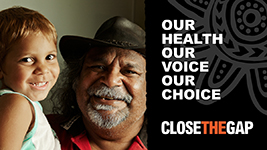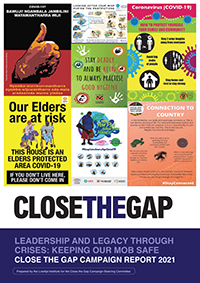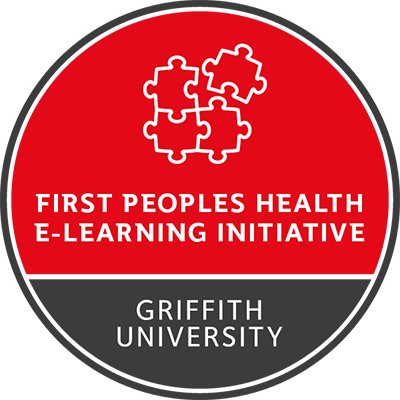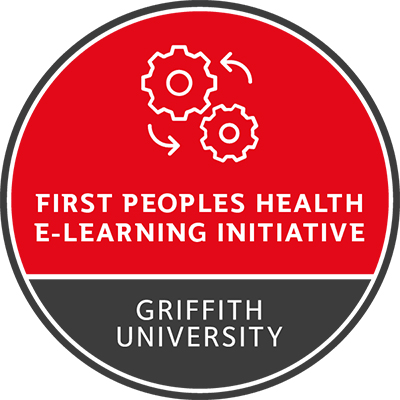ADVOCACY
Advocacy: Public support for an idea, plan, or way of doing something.
You will cover the following for the Advocacy capability:
Descriptor 1: Equity and Human Rights
Descriptor 2: Leadership, Advocacy and Effecting Change
Descriptor 1: Equity and Human Rights
Introduction
The United Nations Resolution 61/295 Declaration on the Rights of Indigenous Peoples adopted by the General Assembly 107th plenary meeting 13 September 2007.
This module is about equity, human rights and leadership. You will continue your lifelong journey towards cultural capability by being able to recognise that the whole health system is responsible for improving Aboriginal and Torres Strait Islander health and that advocating for equitable outcomes and social justice for Aboriginal and/or Torres Strait Islander peoples actively contributes to social change.
This descriptor develops understanding of equity, human rights and leadership. To analyse how the health system is responsible for improving Aboriginal and/or Torres Strait Islander Peoples health including how health professionals can advocate for equitable outcomes and social justice for Aboriginal and/or Torres Strait islander peoples and actively
Learning Outcome
Upon the completion of this topic you should be able to:
- gain an initial understanding of Human Rights and their relationships to social justice; and
- identify possible strategies to interpret inequity in health care for First Peoples.
Social Justice and Human Rights
Social justice and human rights are about making sure that every Australian has a choice about how they live and the means to make those choices (Human Rights and Equal Opportunity Commission, 2003).
What do social justice and human rights look like?
These are two distinct but related concepts. The latter is often ‘measured’ by the former. The latter are developed by the UN, the former are ways governments achieve those human rights.
- Waking up in a house with running water and proper sanitation;
- Ensuring children receive an education that helps them develop their potential and respect their culture;
- Having satisfying employment and good health (Human Rights and Equal Opportunity Commission, 2003).
The United Nations also recognises the distinctive rights of First Peoples of this land and its Declaration of Indigenous Rights. These include:
- The right to a distinct status and culture, which helps maintain and strengthen the identity, spiritual and cultural practices of First Peoples communities;
- The right to self-determination, which is a process where First Peoples communities take control of their future and decide how they will address the issues facing them; and
- The right to land, which provides the spiritual and cultural basis of First Peoples communities (Human Rights and Equal Opportunity Commission, 2003)
Inequality vs Inequity
The World Health Organisation defines health inequalities as the “difference in health status or in the distribution of health determinants between different population groups” (WHO, 2016) and recognises that some of the determinants of health are “unnecessary and avoidable as well as unjust and unfair, so that the resulting health inequalities also lead to inequity in health” (WHO, 2016). The concept of ‘unfairness’ is central to understanding ‘inequity’ as it relates to groups such as First Peoples who are especially socially disadvantaged, for example, through racism and discrimination that hinders access to opportunities to pursue health (Taylor & Guerin, 2014).
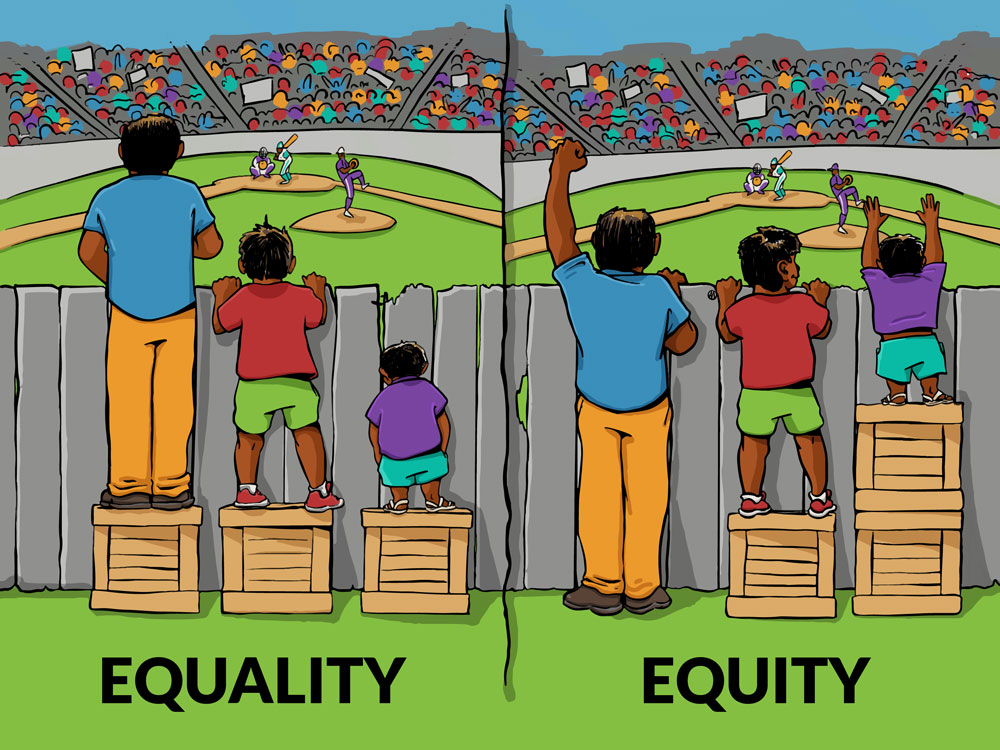
Equality
Is about SAMENESS. It promotes fairness and justice by giving everyone the same thing BUT it can only work if everyone starts from the SAME place.
Equity
Is about FAIRNESS. It is about making sure people get access to the same opportunities. Sometimes our differences and/or history, can create barriers to participation and so we must first ensure EQUITY before we can enjoy EQUALITY.
Descriptor 2: Leadership, Advocacy and Effecting Change
Introduction
Advocacy: Recognise that the whole health system is responsible for improving Aboriginal and Torres Strait Islander health. Advocate for equitable outcomes and social justice for Aboriginal and Torres Strait Islander Peoples and actively contribute to social change.
This descriptor introduces students to the representative health professional organisations that advocate for change and promote better health and wellbeing of Australia’s First Peoples. Recognise that the whole health system is responsible for improving Aboriginal and Torres Strait Islander health. Advocate for equitable outcomes and social justice for Aboriginal and Torres Strait Islander peoples and actively contribute to social change.
Learning Outcome
Upon the completion of this topic you should be able to identify professional leadership bodies that can assist you in addressing challenges in culturally safe health care within the health system.
Content
Below are the various health professional organisations that advocate for change and promote better health for Australia’s First Peoples.Watch the video for the National Congress of Australia's First Peoples and then view the video for the Close The Gap campaign decade in review.

Close The Gap Campaign
Close the Gap is a social justice campaign that aims to achieve health equality (measured as life expectancy equality) for Aboriginal and Torres Strait Islander people by 2030 (Holland, C. 2016).
Learn more about Close The Gap
Close The Gap Day 2021
Close The Gap - ABC 7.30 Report
Close The Gap - A Decade in Review
Ganngaleh nga Yagaleh Study (CLOSED)
Post-learning Survey
Please be advised this study is now closed.
Thank you to all of the participants who contributed to this study.
At the beginning of your Yuwahn Wupin learning journey you were asked to contribute to the Ganngaleh nga Yagaleh Study. Gifted form the Yugambeh language Peoples this short title for the study means "cultural-safety".
The Ganngaleh nga Yagaleh Study aims to evaluate the effectiveness of Aboriginal and Torres Strait Islander health and cultural safety education and training.
If you completed the pre-learning survey we would greatly appreciate your contribution to the research by also completing the post-learning survey. This survey will take approximately 15-20 minutes to complete.
Ganngaleh nga Yagaleh Study post-learning survey
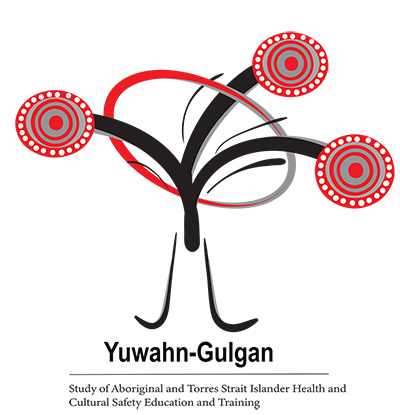
Register to receive your digital badge
Reminder - Badge attainment is recognition you have engaged with the module content, completed the quizzes and achieved outcomes that are aligned to the First Peoples Health Curriculum.
Prepare to receive your digital badge before you complete the final quiz module for Yuwahn Wupin.
Create an account through the Acclaim platform and learn about the digital badge that will be issued -
NOW TAKE THE QUIZ FOR ADVOCACY...
Before you take the final quiz did you complete the Yuwahn-Gulgan post-learning survey above?
References
Taylor K, Guerin P. (2014) Health care and Indigenous Australians: Cultural safety in practice
https://www.who.int/publications/m/item/glossary-of-terms-used-for-health-impact-assessment-hia
Holland, C. (2016). Close the Gap: progress and priorities report 2016. Canberra: Close the Gap Campaign Steering Committee.
